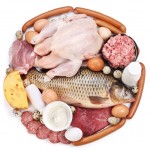Protein 101

If you're like me and don't actually know what protein is and why it is good for you, then read on:
WHAT is Protein:
Proteins are large biological molecules made up of amino acids. When you consume protein-rich food, the ingested protein is broken down into amino acids, which are then used to build specialized protein molecules for specific jobs in your body and to perform other important bodily functions.
Complicated, eh? It's okay if you have to read that paragraph again (and a couple times after that...).
Benefits:
Protein is extremely important for tissue growth and repair; it will also keep your hair and nails looking flawless. It also keeps your belly full and your immune system in check. Plus, protein provides the body with energy so you won't feel fatigued.
Best Sources:
Get protein from eggs, white meat poultry, seafood, turkey, beef and protein shakes, but only every now and then. Vegetarian? Don't worry, I got you covered. Eat and enjoy beans, quinoa and soy.
Protein Powder: When, Where and Why?:
Seems like you can't even go to the gym nowadays without seeing someone with a protein shake in hand. But guess what: protein powder isn't recommended to use as a substitute for protein, especially if you are able to consume a normal diet (i.e. you aren't a vegetarian, you have access to fresh food, you're not training for the Olympics, et cetera).
Protein powder is highly processed and full of chemicals (which is hard for your body to break down), and consuming too much protein is really bad for your liver and kidneys. When you take in more protein than you need, your body will start to store the excess as fat instead. If you're actively trying to build muscle or have a protein deficiency, use protein powder in moderation.
The post Protein 101 originally appeared on Spoon University. Please visit Spoon University to see more posts like this one.

